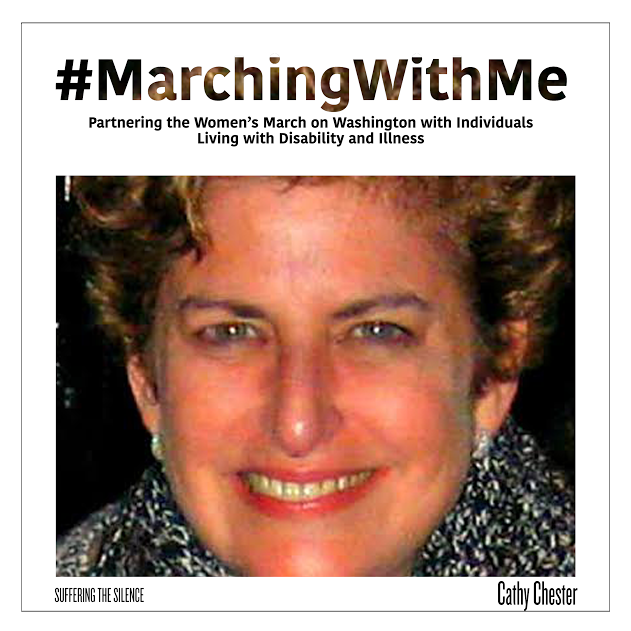I submitted the following piece to several news outlets in advance of the Women's March on Washington. Crickets. At this late date I decided to publish it here for informational purposes. The links provided will be helpful to the disability community and their loved ones in the coming years.
When I first heard about the January 21 Women’s March on Washington and their nationwide sister marches I was excited. After all I consider this my 1960’s, a time when women must use their voices to protect our rights that were negatively attacked by the president-elect.
To that end I’ve been busy signing petitions, writing articles, posting news stories, calling legislators, attending meetings and becoming a social justice activist to defend the rights of all American citizens.
I considered going to Washington to march, then changed my mind to join a friend marching in Philadelphia. With accessibility on my mind the logistics of the day caused me great concern. As the day drew near I knew I’d be unable to walk the necessary miles, doubting I’d be able to keep up with my able-bodied friends.
According to the 2010 U.S. Census about 56.7 million people have a disability. I am one of them. As a women with a disability I will fight for my rights along with those of other disabled women.
As I began reading posts on several social media platforms about making plans for the march I began feeling invisible. When I thought about it I realized, once again that something was missing.
I read through the Unity Principles of the Women’s March and noticed an absence of inclusion of the disability community. I was disheartened.
As the mission of the Women’s March states:
“In the spirit of democracy and honoring the champions of human rights, dignity, and justice who have come before us, we join in diversity to show our presence in numbers too great to ignore. The Women’s March on Washington will send a bold message to our new government on their first day in office, and to the world that women's rights are human rights. We stand together, recognizing that defending the most marginalized among us is defending all of us.”
Absolutely. To defend those who are being marginalized. This is crucial. Yet historically the disabled have been globally ignored. Now is the time to end that discrimination.
We are not invisible. We are here. We have voices. We add value. We matter.
When the president-elect mocked a disabled reporter we were marginalized. With ACA being threatened with the possibility of millions becoming uninsured we are being marginalized. And when we’re not mentioned among the important groups being threatened by the new administration we are being marginalized.
So I was feeling pretty low about the march, asking myself who will support us? I began to do some research and found my answer.
First, I found a group called Disability March. Created by Sonya Huber, the Disability March provides a way for people like me to participate in an online-only march as a contingent of the Women's March on Washington.
By emailing them a photo of ourselves with a short explanation about why we feel strongly about the march, they’ve provided us with an opportunity to speak our minds. Here are four examples :
According to Sonya Huber:
“I started the online disability march after talking with my friends about how it would be hard for me to go to DC and how sad I was about that. All three of us have mobility/health issues and are writers, so I thought a blog would be an easy place to start. In particular I wanted to open up the idea of activism and challenge the idea that the only way to be active is to go physically to a place. I think demonstrations and marches are so important, but there are so many people who will be negatively affected by Republican policies who cannot travel to protest.
I contacted the Women's March organizers early on and made some edits to our site based on feedback from them and from other writers, and we just became an official co-sponsor of the march last week.
As I mentioned in the Bustle article, I am glad that the organizers of the march added a statement about disability as a separate bullet point of the unity principles, but it's important for the sake of history to know that it was left out initially, just as a reminder of how often disability is not viewed as an intersectional issue at an equal level to other elements of our identities.
I do support the march and I applaud the huge amount of effort and care the march organizers are taking. I also am very excited that the march organizers are not going for the lowest common denominator but instead explicitly mentioning racial justice as a cornerstone of the march, as this is where progressive movements need to orient!
If people want to get active in the Disability March, all they have to do is send an email to disabilitymarch@gmail.com. We will also be tweeting on Friday and Saturday with the hashtag #disabilitymarch.”
Terry Marttinen, a member of the Disability March, explained why she joined::
“For me broad-based inclusion of people with disabilities is fundamental in view of my experience and studies. I supported this project early as a participant because I think it opens up space for a range of people with disabilities to voice protest over issues affecting the U.S. and globally. It is a way to promote meaningful inclusion in women's movements with potential for future direct activism in U.S context.
Then I found Women’s March on Washington - Disability Caucus (@WMWDisability). On their Facebook page they state:
The disability community is often forgotten and left out of the political, economic, and social spheres. It is time that we have a prominent voice in the social justice cause. As we have done throughout history, we will join other groups to support social justice, equality, and unity. Sign up for assistance: http://www.signupgenius.com/go/9040a4badab2cab9-signup
It’s hard enough living with the daily struggles of a disability, but the double whammy is when you’re unable to join others in a fight you strongly believe in.
That’s why I’d like to thank Sonya Huber and her friends for creating the brilliant idea of the Disability March.
I’d also like to thank the kindness of a stranger who, on Facebook, asked if she could carry my name on a necklace so I could “walk” in Washington.
Thanks to an old friend who knit a purple hat (the “color” of the march) to wear in my honor as she marches in Washington.

Thanks to Suffering the Silence this badge will be worn on someone's coat at the Women's March on Washington. We walk together.
And many thanks to a group I just “met” called Suffering the Silence whose campaign #MarchWithMe matches those unable to march with those who’ll march in their honor.
To sign up as a Mentor or Supporter of Suffering the Silence simply send your name and a photo of yourself to http://www.sufferingthesilence.com/single-post/2017/01/12/MarchingWithMe Then go to their website to learn more about their commitment to empower patients, friends and family to speak out and share stories. They are doing tremendous things to “transform the medical and social perception of those living with chronic disease.”
There are silver linings in everything, and despite dark clouds ahead I’m energized by the commitment of many to stand together for those being marginalized. I am proud to be part of the Women’s March and the Disability March and all they stands for. I hope the Women’s March continues to automatically include the disability community in their vision of inclusion.
This country was built on the idea of human rights for all. Let’s stand strong together to make sure no one’s rights are ever taken away.
(NOTE: I highly recommend reading an excellent article about disability rights being absent from the Women’s March by Emily Ladau at TheEstablishment.com and kudos to Emily.)

Wow and thank you, Cathy. I've been in silence around this, not knowing what to say, as my friends, family & colleagues in social justice are joining together for this-- without me. Now, I'm going to blog on this, as you did. Thank you, again!
I am so glad that the disability community will have a presence at the March -- as they should! You will be with me in spirit as I march, my friend!
I want to know if I can bring my own walker into the March? It's portable, as wheels and a pull down seat??? Help asap please
My prayer is for our new president to now recognize that ALL people are precious on earth. Compassion is one attribute he so sorely is missing.
The power of many and that if thinking outside of the proverbial box. Thankful for our neighbors who are helping heal worlds of hurt. ❤️